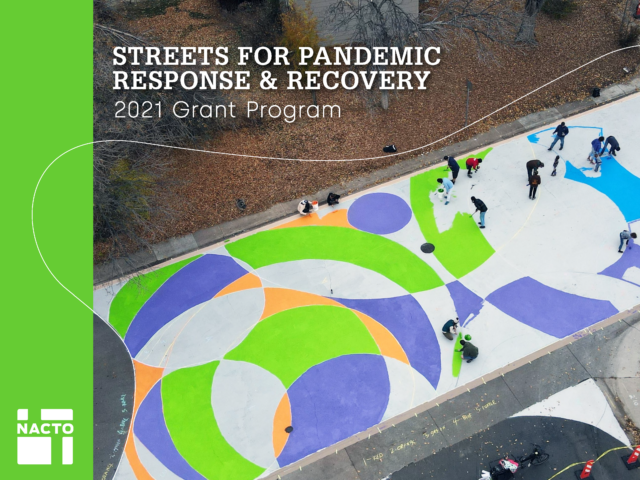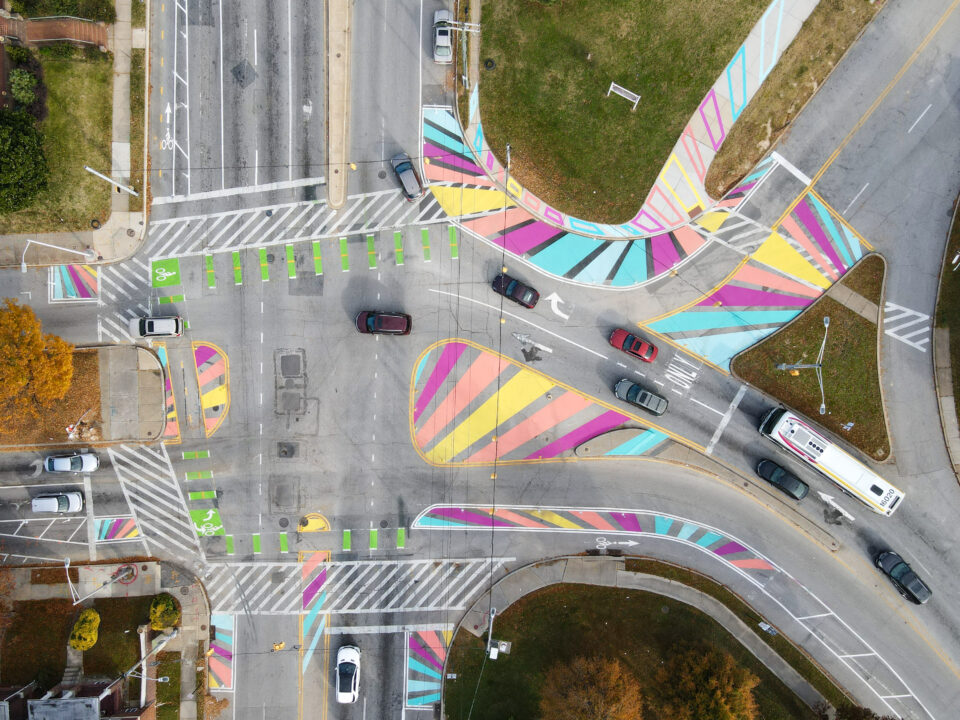Background
Coming off the success of the 2020 Streets for Pandemic Response and Recovery grant program, NACTO again offered a competitive grant opportunity to ten city transportation agencies. With funding from Bloomberg Philanthropies, city agencies partnered with community-based organizations working to center community expertise in Covid-19 response and recovery.

Read the 2021 grant report (pdf)
As cities continued to face challenges from the pandemic — and its exacerbation of pre-existing social inequities and economic hardships within communities — it was imperative to center equity, safety, and relationship-building throughout the grant program. Utilizing the strategies outlined in Streets for Pandemic Response and Recovery, the 2021 cohort implemented projects to repurpose public and street space, applying lessons learned from the past two years, and found ways to meaningfully plan for and deliver programs based on — and in direct response to — stated community concerns.
The selected projects received funding, as well as peer learning, technical assistance, and expert coaching. Based on lessons from the 2020 program, NACTO increased the funding and project duration for 2021 grantees, giving cities, their partners, and the communities they serve more time to build relationships and co-create project plans before diving into project design and implementation.
The projects fell into three broad categories, but all revolved around a central theme: enabling a shift in thinking about what issues community members face both before, and because of, the pandemic, and how cities can wield their power to help identify and address them. Projects focused on:

- Safe Passage Park: San Francisco & the Tenderloin Community Benefit District
- A Civic Plaza for All: Washington, DC & District Bridges

- Lake-to-Lake Public Space: Baltimore & Black People Ride Bikes, Bikemore, and Graham Projects
- The Paint Pot: Fort Collins, CO & Bike Fort Collins and Mujeres de Colores
- 18th Ave & Little Earth Engagement and Demonstration Project: Minneapolis & Little Earth of United Tribes
- Safe Routes to School Streets: Los Angeles & Los Angeles Walks
- Reimagining Little Brook Stay Healthy Street: Seattle & Lake City Collective

- Carts in Parks, A Parks Vending Pilot Program: Madison, WI & the Latino Chamber of Commerce
- Parking Spaces to People Places: Portland, OR & The Rosewood Initiative
- Jazz Alley, Recovery & Celebration in Historic Five Points Neighborhood: Denver & the Five Points Business Improvement District
Lessons for Success
The lessons below represent and synthesize what NACTO and the city-community grant teams learned through these projects. These lessons can serve other cities seeking to implement projects in partnership with community-based organizations.
Partnership Models: During the program, cities experimented with models that most effectively allowed for collaboration with community partners, ranging from cities taking full lead on project design, to community partners leading complete ideation and implementation with the city playing more of a supporting role.
Co-Working & Relationship Building: Cities also used the program to strengthen relationships with their community partners. For those that didn’t already have this strong relationship, this was an opportunity to step out of comfort zones in order to make amends for years of mistrust and misunderstanding.
Paying Community Members: Cities also recognized the value of community champions and groups – hardworking individuals who dedicate everything to the neighborhoods and people they love most.
Making the Case: The grant program provided an excellent opportunity for cities to make the case to continue their projects in the future, as exemplified through documenting projects with high quality before and after photos, creating videos of events and implementation, and gathering quotes and survey data from the community during project implementation.

A grant-supported project in Baltimore (Graham Projects)
What’s Next
Although progress is being made in many ways to fight the pandemic, its devastating impact and exacerbation of pre-existing crises continue to spread throughout communities. The Streets for Pandemic Response and Recovery grant program is aimed at helping to create models of programming that chip away at decades of inequity, mistrust, and disinvestment in our cities. By reflecting on and incorporating the lessons and processes learned from this program, our hope is that the work from these cohorts of cities can contribute to creating more concrete, longstanding successes down the line. The end goal: building bridges within communities and cities, and furthering the necessary work so that our cities are places in which all people can co-create opportunities to live with fulfillment.
Read more about the inspiring projects and notable strategies from this year’s program in the 2021 Streets for Pandemic Response & Recovery Grant Report.